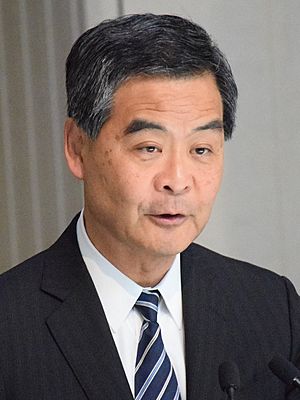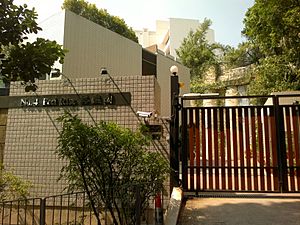Leung Chun-ying facts for kids
Quick facts for kids
Leung Chun-ying
GBM GBS JP
|
|||||||||||||||||||||
|---|---|---|---|---|---|---|---|---|---|---|---|---|---|---|---|---|---|---|---|---|---|
|
梁振英
|
|||||||||||||||||||||

Leung in 2017
|
|||||||||||||||||||||
| 3rd Chief Executive of Hong Kong | |||||||||||||||||||||
| In office 1 July 2012 – 30 June 2017 |
|||||||||||||||||||||
| President | Hu Jintao Xi Jinping |
||||||||||||||||||||
| Premier | Wen Jiabao Li Keqiang |
||||||||||||||||||||
| Preceded by | Donald Tsang | ||||||||||||||||||||
| Succeeded by | Carrie Lam | ||||||||||||||||||||
| Vice Chairman of the Chinese People's Political Consultative Conference | |||||||||||||||||||||
| Assumed office 13 March 2017 |
|||||||||||||||||||||
| Chairman | Yu Zhengsheng Wang Yang Wang Huning |
||||||||||||||||||||
| Convenor of the Non-Official Members of the Executive Council | |||||||||||||||||||||
| In office 1 July 1999 – 3 October 2011 |
|||||||||||||||||||||
| Appointed by | Tung Chee-hwa Donald Tsang |
||||||||||||||||||||
| Preceded by | Chung Sze-yuen | ||||||||||||||||||||
| Succeeded by | Ronald Arculli | ||||||||||||||||||||
| Member of the Chinese People's Political Consultative Conference | |||||||||||||||||||||
| Assumed office 28 February 2017 |
|||||||||||||||||||||
| In office 16 March 2003 – 21 June 2012 |
|||||||||||||||||||||
| Member of the Legislative Council | |||||||||||||||||||||
| In office 21 December 1996 – 30 June 1998 |
|||||||||||||||||||||
| Personal details | |||||||||||||||||||||
| Born | 12 August 1954 Queen Mary Hospital, Pok Fu Lam, Hong Kong |
||||||||||||||||||||
| Political party | Progressive Hong Kong Society (1980s) New Hong Kong Alliance (1990s) |
||||||||||||||||||||
| Spouse |
Regina Leung Tong Ching-yee
(m. 1981) |
||||||||||||||||||||
| Children | 3 | ||||||||||||||||||||
| Residences | 4 Peel Rise, The Peak | ||||||||||||||||||||
| Education | King's College | ||||||||||||||||||||
| Alma mater | Hong Kong Polytechnic (HD) Bristol Polytechnic (BS) |
||||||||||||||||||||
| Origin | Weihaiwei, Shandong | ||||||||||||||||||||
| Signature |  |
||||||||||||||||||||
| Nickname | CY Leung | ||||||||||||||||||||
| Chinese name | |||||||||||||||||||||
| Chinese | 梁振英 | ||||||||||||||||||||
|
|||||||||||||||||||||
Leung Chun-ying (born 12 August 1954), also known as CY Leung, is a Hong Kong politician. He was the third Chief Executive of Hong Kong from 2012 to 2017. This is like being the leader of the Hong Kong government. Since March 2017, he has been a vice-chairman of the National Committee of the Chinese People's Political Consultative Conference.
Before becoming Chief Executive, Leung was a professional surveyor. He started getting involved in politics in 1985. He became a key advisor to the government and later ran for the top leadership role in Hong Kong. His time as Chief Executive saw some big protests and challenges.
Contents
Early Life and Education
Leung Chun-ying was born in Queen Mary Hospital in Pok Fu Lam, Hong Kong, on 12 August 1954. His father was a police officer in Hong Kong.
He received a scholarship to study at King's College. After that, he went to Hong Kong Polytechnic. In 1974, he continued his studies in valuation and estate management at Bristol Polytechnic (now the University of the West of England) in the United Kingdom. He graduated in 1977 as the top student in his class.
Business Career
After finishing his studies, Leung became a chartered surveyor. He returned to Hong Kong and worked for a real estate company called Jones Lang Wootton for five years. By the time he was 30, he became a vice-chairman of the company's Hong Kong branch.
He also worked as a real estate advisor for Zhu Rongji, who later became the Premier of China. From 1995 to 1996, Leung was the president of the Hong Kong Institute of Surveyors. He also advised local governments in mainland China on land reform.
In 1993, Leung started his own surveying company, C. Y. Leung & Co. This company grew quickly and opened offices in Shanghai and Shenzhen. In 2000, his company merged with another to form DTZ Debenham Tie Leung Limited. Leung later became a significant owner in DTZ Holdings, a large property consultancy.
In 2011, before he ran for Chief Executive, DTZ Holdings faced financial difficulties. The company was then sold to another company called UGL. Leung resigned from the board of DTZ shortly before announcing his candidacy for Chief Executive.
Early Political Roles
In 1985, Leung joined the Hong Kong Basic Law Consultative Committee (HKBLCC). This group helped gather opinions from Hong Kong people about the Hong Kong Basic Law, which is like Hong Kong's mini-constitution. In 1988, he became the Secretary-General of this committee.
In 1998, he was appointed as the convenor of the Executive Council of Hong Kong. This council advises the Chief Executive on important decisions. He held this position until 2011. In 1999, he received the Gold Bauhinia Star award from the Hong Kong Government.
Leung also served as the chairman of the campaign for Tung Chee-hwa, who was re-elected as Chief Executive in 2002. He was also a member of the Chinese People's Political Consultative Conference, a top advisory body in mainland China.
From 1999 to 2008, Leung was the council chairman of Lingnan University. He also served as chairman of the council of the City University of Hong Kong from 2008 to 2011.
Chief Executive Campaign
On 28 November 2011, Leung Chun-ying officially announced he would run for Chief Executive of Hong Kong. The election was a tough competition.
The main opponent was Henry Tang. Both candidates faced questions about their homes having illegal structures. Leung denied claims that he was a secret member of the Chinese Communist Party, which would have gone against election rules. He also faced questions about whether he had strong support from Beijing.
On 25 March 2012, Leung was chosen as Hong Kong's new Chief Executive. He received 689 votes from the 1,200-member election committee.
After his selection, more questions arose about illegal structures at Leung's own house. This caused some controversy as he had criticized his opponent for a similar issue.
As Chief Executive
Leung Chun-ying officially became Chief Executive on 1 July 2012. His time in office began with some challenges and public discussions.
Public Opinion and Challenges
Leung's popularity ratings were often low during his term. In 2014, his government faced large protests known as the "Umbrella Revolution." These protests were about how Hong Kong's leader should be chosen. The movement gained global attention.
He also faced questions about a business deal he had made before becoming Chief Executive. These questions further affected his public image. In an interview during the 2014 protests, Leung made comments about income levels in Hong Kong that were seen as insensitive by many.
Government Structure
Under the "one country, two systems" principle, Hong Kong has three main parts of government: the executive, the legislature, and the judiciary. In 2015, a Chinese official stated that the Chief Executive's position was "special" and "overrides" these parts. Leung Chun-ying later agreed with this view.
These statements caused debate in Hong Kong, as many believed they went against the idea of separate powers. The Chief Justice of Hong Kong stated that no one is above the law.
Decision Not to Seek Re-election
Leung was expected to run for a second term as Chief Executive in 2017. However, on 9 December 2016, he announced that he would not seek re-election. He said he wanted to focus on his family. He was the first Chief Executive not to run for a second term.
After Being Chief Executive
After his term as Chief Executive ended, Leung continued to be involved in public discussions.
In May 2020, he suggested that HSBC should support the National Security Law. In October 2020, he announced plans to legally challenge the Education Bureau to reveal the names of teachers involved in incidents during the 2019-2020 Hong Kong protests. He also publicly shared details of 18 teachers who were charged.
In January 2021, Leung suggested that Hong Kong residents who get British citizenship should give up their Hong Kong passports. He also said that Hong Kong's Chief Executive could be chosen without voting, which raised concerns about democratic elections.
In March 2021, Leung claimed that efforts to push for more democracy in Hong Kong had made some people act like separatists. He also said that Hong Kong's way of life was designed by the Chinese Communist Party.
In May 2021, Leung brought up an old idea to build housing on parts of country parks to help with housing issues in Hong Kong.
In October 2021, his name appeared in the Pandora Papers, which exposed secret offshore accounts of various world leaders. He denied any wrongdoing.
In August 2022, Leung criticized Nancy Pelosi's visit to Taiwan. In October 2022, he said that people overseas misunderstood Hong Kong's situation. He also suggested that high-level government officials should give up their foreign passports.
In November 2022, Leung criticized the High Court for allowing a foreign lawyer to represent Jimmy Lai.
Personal Life
In 1981, Leung married Regina Ching Yee Higgins. They have two daughters and one son. Although Leung had said he would not send his children to study abroad, his children later studied and worked in Britain.
One of his daughters, Chai-yan Leung, often attracted media attention for her public behavior and comments about her family life. In March 2015, police and ambulance services were called to Government House after she posted messages about an argument with her mother.
Leung's younger daughter, Chung-yan, was involved in an incident at Hong Kong International Airport in March 2016. She reportedly left her hand baggage behind after passing security. Her mother asked airport staff to retrieve the bag, which led to a discussion about security rules. Leung denied using his power to get the bag back. This incident led to protests at the airport and a drop in Leung's popularity.
In December 2022, Leung tested positive for COVID-19 after traveling.
Nicknames
Early in his career, Leung was nicknamed "Working-class emperor" because he earned a high salary.
Later, during his election campaign, some opponents called him "The Wolf" because of his cleverness. He was also sometimes called "Dracula" due to his teeth.
After an anti-government protester threw an Lufsig plush toy at him in 2013, Leung became associated with the toy. Lufsig is a wolf toy, and its Chinese name sounded like a rude word in Cantonese, which many people who disliked Leung found amusing.
Since becoming Chief Executive, Leung has also been called "689." This nickname refers to the 689 votes he received to win the election, which was seen by some as a small number compared to the total population of Hong Kong. It is used to show that many people felt he did not have widespread support.
See also
 In Spanish: Leung Chun-ying para niños
In Spanish: Leung Chun-ying para niños
- Leung administration
- Politics of Hong Kong
- Carrie Lam
Images for kids
 | Victor J. Glover |
 | Yvonne Cagle |
 | Jeanette Epps |
 | Bernard A. Harris Jr. |



